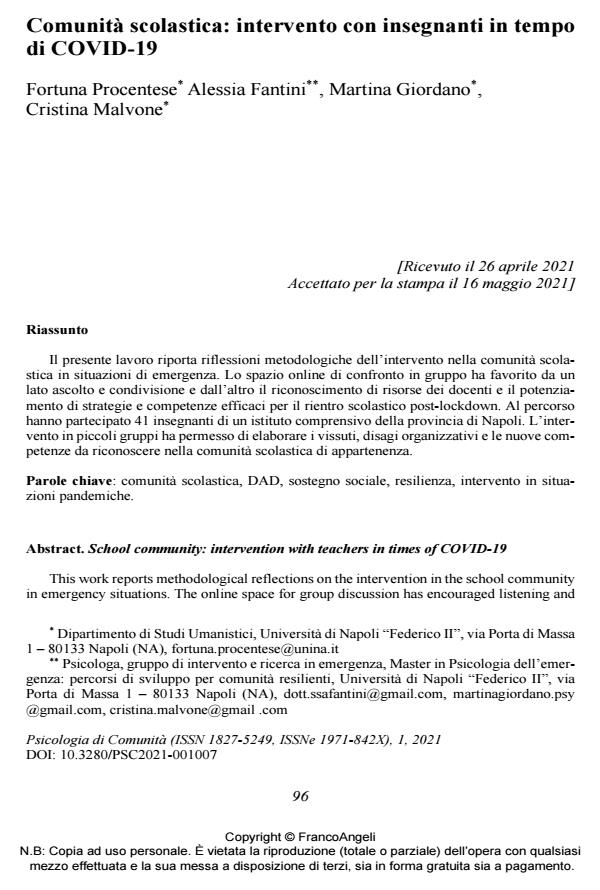Comunità scolastica: intervento con insegnanti in tempo di COVID-19
Titolo Rivista PSICOLOGIA DI COMUNITA’
Autori/Curatori Fortuna Procentese, Alessia Fantini, Martina Giordano, Cristina Malvone
Anno di pubblicazione 2021 Fascicolo 2021/1
Lingua Italiano Numero pagine 15 P. 96-110 Dimensione file 202 KB
DOI 10.3280/PSC2021-001007
Il DOI è il codice a barre della proprietà intellettuale: per saperne di più
clicca qui
Qui sotto puoi vedere in anteprima la prima pagina di questo articolo.
Se questo articolo ti interessa, lo puoi acquistare (e scaricare in formato pdf) seguendo le facili indicazioni per acquistare il download credit. Acquista Download Credits per scaricare questo Articolo in formato PDF

FrancoAngeli è membro della Publishers International Linking Association, Inc (PILA)associazione indipendente e non profit per facilitare (attraverso i servizi tecnologici implementati da CrossRef.org) l’accesso degli studiosi ai contenuti digitali nelle pubblicazioni professionali e scientifiche
Il presente lavoro riporta riflessioni metodologiche dell’intervento nella comunità scolasti-ca in situazioni di emergenza. Lo spazio online di confronto in gruppo ha favorito da un lato ascolto e condivisione e dall’altro il riconoscimento di risorse dei docenti e il potenziamento di strategie e competenze efficaci per il rientro scolastico post-lockdown. Al percorso hanno par-tecipato 41 insegnanti di un istituto comprensivo della provincia di Napoli. L’intervento in pic-coli gruppi ha permesso di elaborare i vissuti, disagi organizzativi e le nuove competenze da riconoscere nella comunità scolastica di appartenenza.
Parole chiave:comunità scolastica, DAD, sostegno sociale, resilienza, intervento in situazioni pandemiche.
- Protective and risk social dimensions of emergency remote teaching during COVID‐19 pandemic: A multiple mediation study Fortuna Procentese, Flora Gatti, Emiliano Ceglie, in Journal of Community Psychology /2023 pp.67
DOI: 10.1002/jcop.22879 - Gruppo di lavoro su setting di intervento online in psicologia di comunità Fortuna Procentese, Davide Boniforti, Andrea Guazzini, Daniela Marzana, Laura Migliorini, Alessia Rochira, Stefano Tartaglia, in PSICOLOGIA DI COMUNITA' 1/2021 pp.113
DOI: 10.3280/PSC2021-001008
Fortuna Procentese, Alessia Fantini, Martina Giordano, Cristina Malvone, Comunità scolastica: intervento con insegnanti in tempo di COVID-19 in "PSICOLOGIA DI COMUNITA’" 1/2021, pp 96-110, DOI: 10.3280/PSC2021-001007